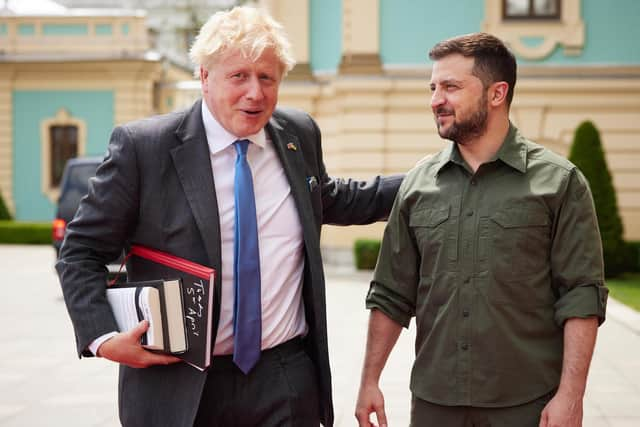NATO summit leaders should focus on how they can strengthen Ukraine's hand - David Hobbs
President Putin’s forces are now concentrating on a brutal, grinding offence in Ukraine’s Donbass region, having failed to rout Ukraine’s defenders around Kiev and replace its government with a puppet regime.
Outnumbered and outgunned, Ukrainian forces are making Russia pay a high price for its advances, but they too are suffering heavy losses.


Advertisement
Hide AdAdvertisement
Hide AdThe hope for Ukraine and its supporters is that the influx of Western military equipment – particularly much-needed artillery systems – will gradually turn the tide of battle in Ukraine’s favour.
But no clear end to the conflict is in sight. Russia simply does not have the capacity to conquer and occupy a country as large as Ukraine and with a population that would certainly not take occupation quietly. On the other hand, even though Ukraine might well begin to regain lost ground, President Putin will be determined to keep at least part of the ground he has seized in his successive land grabs in Ukraine.
He also has an ace up his sleeve that will be difficult to counter: a callous disregard for human life.
Just suppose – and it is not a huge supposition – that Ukraine starts to press back Russian forces and becomes ever more able to strike them tens of kilometres behind the front lines, making it increasingly hard for Russian forces to operate.
Advertisement
Hide AdAdvertisement
Hide AdPresident Putin would have no hesitation in retaliating against civilians: kindergartens, schools, hospitals, and residential areas, deep in Ukraine. In addition – or as well – his forces have some dreadful weapons that President Putin might be prepared to unleash in order to cow Ukraine into submission. So it is difficult to see how the conflict will move beyond a prolonged war of attrition or some sort of hostile equilibrium with no obvious route to an endgame.
Unfortunately, President Putin will see that as a good result.
He would dearly have liked to oust Ukraine’s government, but he will settle for an ongoing conflict that he hopes will undermine Ukraine’s efforts to continue the political and economic reforms enabling it to draw closer to Western standards. The last thing he wants is a successful, democratic, and prosperous Ukraine providing a sharp contrast with his own corrupt regime.
In other words, President Putin’s animosity to Ukraine will last as long as his regime does, and he will believe that time is on his side. When he occupied 20 per cent of Georgia’s territory in 2008, international outrage faded remarkably quickly. And headlines quickly faded after his occupation of Ukraine’s Crimea and parts of the Donbas in 2014. Although Nato’s members took steps to reassure anxious Allies closest to Russia, sanctions were distinctly limited.
Advertisement
Hide AdAdvertisement
Hide AdPresident Putin will be hoping for a repeat performance; that the solidarity of Ukraine’s backers will break down if the conflict drags on.
He will certainly have been encouraged by calls for an “off ramp” – a way to end to end the conflict without President Putin “losing face”– and suggestions that Ukraine should end the conflict with a “compromise”.
Regarding an “off ramp”, President Putin is well able to manufacture his own. Even a battlefield stalemate could be manipulated for presentation as a victory to the Russian public, and if President Putin cared one iota what Western leaders thought, he would not have invaded Ukraine in the first place.
Calling for Ukraine to negotiate is an insult to Ukraine that would mean blatantly rewarding a flagrant violation of international law and human rights. A country has been invaded with the loss of thousands of innocent lives. Surely, Europe does not need another lesson on what happens when a dictator is appeased?
Advertisement
Hide AdAdvertisement
Hide AdWe simply do not know how or when the conflict in Ukraine will end. The first phase began in 2014, and over 14,000 people had died before President Putin began the second phase in February this year.
By all means Western leaders have the right to offer their advice and opinions to President Zelensky – in private. But instead of telling President Zelensky how to play his hand, Western leaders should focus simply on making that hand as strong as possible.
They should also recall that no one knew how long the Cold War would last or how it would end.
Today’s leaders should show the same resolve and staying power as their predecessors.
- Mr Hobbs is former Secretary General of the Nato Parliamentary Assembly and current CEO of the Atlantic Treaty Association of the United Kingdom. He lives in Ilkley.
